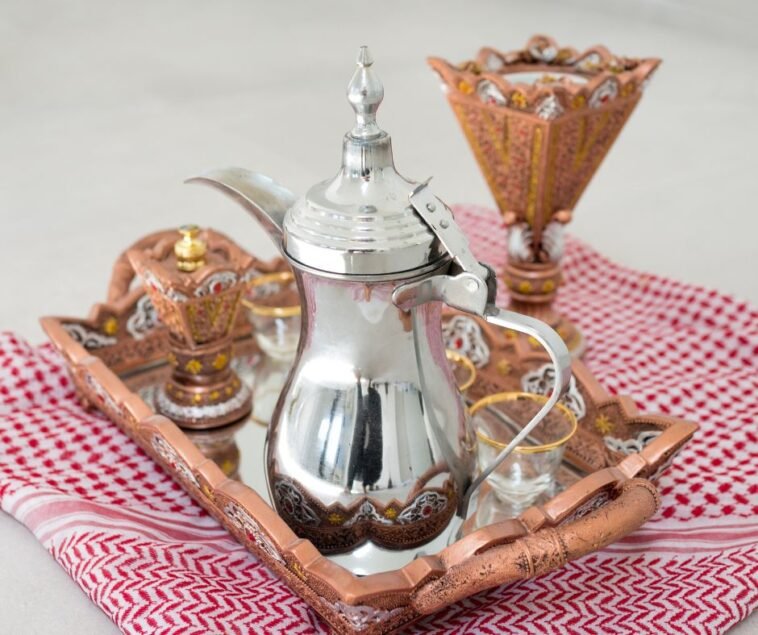Arabic coffee stands as a quintessential part of Qatar’s cultural fabric, representing a cherished traditional hot beverage. This aromatic elixir not only delights the taste buds but also serves as a sensory awakening, engaging all senses in a symphony of flavors and aromas. Crafted from Arabic coffee beans, this brew offers a unique taste profile distinct from conventional coffees, leaving an indelible mark on the palate. Once you’ve savored the richness of Arabic coffee, its captivating flavors linger, making it a memorable and delightful experience. Let’s delve deeper into the enchanting world of Arabic coffee.
Table of Contents
- History of Arabic Coffee
- How does Arabic coffee come into being?
- When Arabic Coffee is served?
- How is it served?
- How healthy is it?
History of Arabic Coffee
Arabic coffee’s historical journey traces back to Ethiopia in the 9th century, where its origins were believed to have taken root. Over the following six centuries, this exquisite beverage, crafted from Arabica coffee beans, underwent a process of refinement and cultural evolution. By the 15th century, Arabica coffee had ascended to prominence, gracing the tables of grand social gatherings and opulent feasts across the lands of North Africa and the Middle East. As time unfurled, this beloved brew embarked on a global voyage, transcending borders to become a favored hot beverage worldwide. Today, the taste and aroma of this delightful coffee have permeated every corner of the globe, marking it as a cherished and universally enjoyed beverage.
How does Arabic coffee come into being?
Over time, coffee derived from Arabica beans underwent a process of evolution in various regions, resulting in a diverse array of flavors and profiles. Known as ‘Qahwa’ in Qatar, Arabic coffee represents a distinct style of brewing that sets it apart from other coffee varieties. Brewed exclusively from Arabica coffee beans, this unique beverage embodies a cultural tradition that is synonymous with Qatar and several other parts of the Middle East. The meticulous preparation of Arabic coffee in these regions is a craft that emphasizes bringing forth its special aroma and enhancing its rich flavor profile, making each cup a sensorial delight that reflects the essence of the region.
When Arabic Coffee is served?
Arabic coffee serves as a vital symbol of Qatari hospitality, deeply ingrained in the cultural fabric of the nation. Traditionally, this aromatic brew is offered to guests in Qatar as a gesture of warm welcome during various events, gatherings, and special occasions. It is a customary practice to serve Arabic coffee to guests, reflecting the host’s generosity and respect for their visitors. Moreover, this cherished beverage is also a common sight in hotels across Qatar, where it continues to embody the tradition of hospitality and the rich cultural heritage of the region.
How is it served?
Arabic coffee in Qatar is steeped in tradition, not just in its preparation but also in the way it is served. Here are some key customs and etiquette surrounding the serving of Arabic coffee:
- Serveware: Arabic coffee is typically poured from a traditional coffee pot called a ‘Dallah’ into small, handle-less cups known as ‘Finjaan’. These cups are delicate and should not be filled to the brim, as it can be seen as an insult. Instead, they are usually filled up to about 1/4th of the cup to prevent guests from burning their mouths while sipping.
- Serving Ritual: When serving Arabic coffee, it is customary to start from the right side of the group and move to the left. Younger individuals often serve their elders as a sign of respect. The server should stand upright, holding the ‘Dallah’ in their left hand and offering the ‘Finjaan’ to the guest with their right hand. It is important not to serve coffee on a tray.
- Acceptance: In Qatari culture, it is considered rude to refuse the coffee offered by the host. If a guest does not wish to have more coffee, they can gently shake the cup to indicate that they have had their fill.
- Pairing: Arabic coffee is typically served without milk or sugar. Instead, it is often accompanied by fresh dates. It is customary to sip the coffee while keeping a piece of the date in your mouth. The sweetness of the date helps balance out the strong flavor of the coffee, enhancing the overall experience.
By observing these customs and etiquette, guests can fully appreciate the cultural significance and hospitality associated with the serving of Arabic coffee in Qatar.
How healthy is it?
Arabic coffee, beyond being a cultural staple, offers a range of potential health benefits, as supported by research. Here are some of the health advantages associated with Arabic coffee:
- Low in Calories: Arabic coffee is relatively low in calories, typically containing around 16 calories per serving. This makes it a suitable choice for those watching their caloric intake.
- Combatting Diseases: Studies suggest that Arabic coffee may play a role in combating various health conditions. It has been linked to potentially aiding in the prevention of dementia, Type II Diabetes, and cardiovascular diseases. Additionally, some research indicates that it may have properties that could help in the prevention of certain types of cancer.
- Skin Health: Arabic coffee is believed to contribute to healthy-looking skin, possibly due to its antioxidant properties. Antioxidants can help protect the skin from damage caused by free radicals.
- Symptom Relief: Arabic coffee may also offer relief from certain ailments. It has been suggested to help alleviate headaches, flu symptoms, and chest congestion, providing a potential natural remedy for these common health issues.
- Caffeine Content: While Arabic coffee offers these potential benefits, it is important to be mindful of its caffeine content. Coffee, including Arabic coffee, contains caffeine, which can have stimulating effects. Consuming coffee close to bedtime may lead to insomnia or disrupt sleep patterns in some individuals.
It’s essential to enjoy Arabic coffee in moderation and be aware of your individual tolerance to caffeine to reap its potential health benefits while managing any potential side effects. As with any dietary component, it’s always advisable to consult with a healthcare professional regarding its consumption, especially if you have specific health conditions or concerns.
Recipe
Ingredients
- Water- 3 cups
- Ground Arabica coffee- 3-4 teaspoons
- Freshly ground green cardamom- 1-2 teaspoons
- A pinch of saffron is optional
Method
- Boiled the water in ‘dallah’.
- Turn off the heat and add the coffee & the cardamom and mix.
- Put the heat on low and let the coffee brew for about 10 minutes or until foam forms.
- Off the heat.
- Add the saffron strands after removing the ‘dallah’ from the stove.
- Remove the ‘dallah’ from the stove and add the saffron strands.
- Set the coffee aside for 5 minutes to allow the cardamom remains to settle.
- You can either strain the Arabic coffee so that any leftover residue/grounds do not enter the finjaans, or you can strain it from the dallah or thermos before serving.
Other Articles you may like
- How to Change Personal Details on the Metrash2 app
- How to Enlist an Extra number to get SMS pop-ups on Metrash
- Metrash 2 App Allows Extension of all Pre-entry Permit Visas
- Qatar Residents and expats can submit the criminal complaints via Metrash2 App
- How to subscribe to Metrash2 through SMS
- Metrash2 Services List for Citizens and Residents of Qatar
- How to activate Metrash2 mobile application online
Please Subscribe Us to get updated with Qatar News, Saudi News, Kuwait News, Health News, UAE News, Iqama, Visa, Jobs, Banking and More.



